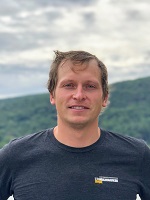

| Title: | Assistant Professor |
| Dept: | Biological, Geological and Environmental Sciences |
| Office: | SR G70 |
| Phone: | 216-687-4820 |
| Email: | b.grunert@csuohio.edu |
| Web: | http://www.coffeeandoptics.com/ |
| Address: | 2121 Euclid Ave. SR G70, Cleveland, OH 44115 |
|
| Education: | ||
|
B.A., Biology, English, University of Missouri, 2010
M.S., Freshwater Science & Technology, University of Wisconsin-Milwaukee, 2013 Ph.D., Geology, Michigan Technological University, 2018 | ||
| Brief Bio: | ||
| My research focuses on characterizing dissolved organic carbon cycling, assessing water quality and estimating ecosystem processes through the lens of optics and satellite remote sensing. With remote sensing, we can view ecological and biogeochemical processes over broad spatial and temporal scales unavailable from in situ measurements. I work across aquatic systems, but much of my research focuses on the Arctic, terrestrial-aquatic interactions, the Laurentian Great Lakes and the coastal ocean.
Much of my work happens in the field and lab. However, working with satellite data sets and developing algorithms requires working with large public datasets. Beyond collecting my own data, I rely heavily on public data repositories. To be efficient and effective, I utilize Matlab and Python for data ingestion and analysis, and SQL databases for data organization and storage. At CSU, I teach remote sensing and GIS courses. In the classroom, I focus on teaching concepts that allow students to handle, explore and analyze geospatial datasets. The overarching goal of the courses I teach is to better understand connections between Earth system processes through space and time. | ||
| Research Grants: | ||
| Connecting Hyperspectral Reflectance with Colored Dissolved Organic Matter Cycling: Lake Superior as a Model System, NASA [NNH20ZDA001N-NIP: New Investigator Program in Earth Science] (PI)
Remote sensing of environmental change in Arctic coastal aquatic ecosystems, NASA [NNH20ZDA001N-OBB: Ocean Biology and Biogeochemistry] (Co-I) Integrating multidisciplinary observations to understand the linkages between air quality and coastal aquatic ecology during the COVID-19 pandemic, NASA [NNH20ZDA001N-RRNES: Rapid Response and Novel Research in Earth Science] (Co-I) | ||